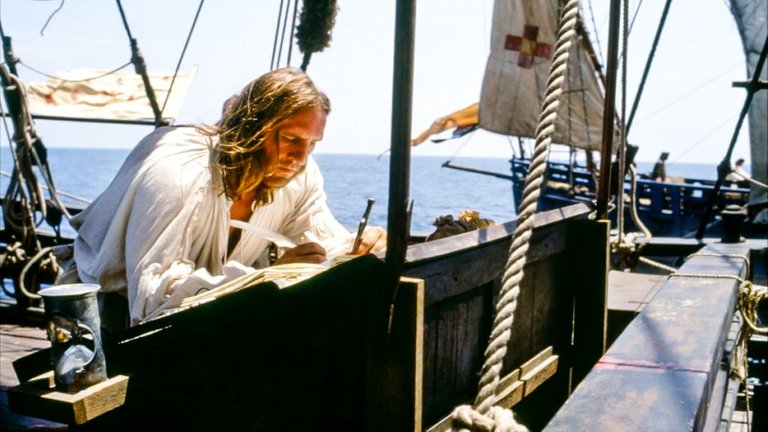
SPECIAL NOTE: The capsule version of this review is available here.)
Great historical anniversaries are often good opportunity for filmmakers eager to make good old-fashioned historical spectacles. This is especially so in countries with cinema industries under control or heavy influence of state bureaucracies. Nice example is year 1989 A.D. Three countries - France, Finland and Serbia - each had their own historical epics motivated by the desire to mark certain important anniversary (200 since French Revolution, 50 years since Winter War and 600 years since Battle of Kosovo). Three years later came another anniversary, which had little to do with old-fashioned patriotism but nevertheless produced two different historical epics - 500 years since Columbus' discovery of America. This anniversary, which had arrived during the zenith of "political correctness", stirred a lot of controversy and Hollywood became interesting, which resulted in two ambitious projects in 1992. The first was John Glen's Christopher Columbus: The Discovery, and the latter and better known was 1492: Conquest of Paradise, directed by Ridley Scott.
Few films have their plot as familiar to the average viewer as this one. In 1492 Christopher Columbus (played by Gerard Depardieu), Genoan captain employed by Spanish Crown, sails westward at the helm of naval expedition that was about to find new, supposedly safer and shorter route to India and China. After few months the expedition finds new uncharted land and later triumphantly returns to Spain with Columbus blissfully unaware that he actually discovered whole new continent. Script by French journalist Roselyn Bosch deals less with a voyage itself and more with the events that had preceded it, as well as its less immediate consequences. Large section of the film depicts Columbus' struggle with sceptics, his attempts to find funding for the expedition and long-time courting of Queen Isabella (played by Sigourney Weaver). Equally large section of the film is devoted to Columbus' subsequent expeditions and his role as a governor of new Spanish colonies - attempt that would result in Indian rebellions, mutinies among his own soldiers, political backstabbing by his lieutenants and similar disasters.
Bosch's script is in many ways reflection of controversies that followed 500th anniversary. The film tries to celebrate Columbus' voyage as one of the most important events of history, triumph of science, technology and human perseverance and step for mankind almost equal to Neil Armstrong's successful landing at Moon. Yet in the same time the script bends to the dogmas of "political correctness" and gives arguments to all those who saw Columbus as one of greatest villains of history - man responsible for the 500 years of rape, genocide and oppression of indigenous Americans. Native Americans in this film are presented as noble savages, their land looks like tropical paradise, while Spanish colonists and conquistadors are either homicidal sadists or ruthless conspirators. Columbus is somewhere in the middle, sympathetic to the Indian plight yet tragically unable to prevent the genodide or his own downfall. The tone and political message of the film is in many ways reflection of its own times – pro-Indian attitudes reflect environmentalist sentiments of early 1990s, while the images of Jews and Muslim being brutally expelled from Spain correlate with similar events in Bosnia five centuries later.
This film has lot of texture, but the choice of director proved to be rather unfortunate. Ridley Scott can indeed make extraordinary films, but here he failed to use his extraordinary talents for the purpose of storytelling. As a result, 1492: Conquest of Paradise is full of beautiful shots and truly impressive images, but they prove to be too distractive and often only make this film longer. To make things even worse, Bosch in the latter half of film has to find some dramatic conflict to keep the audience's attention. Her choice is mutiny led by Spanish noble Moxica (played by Michael Wincott). In hands of Ridley Scott this subplot turns into incomprehensible mess - Moxica with his long black hair is at times indistinguishable from Indians, editing is poor and Scott again shows his inability to direct proper action scenes (impediment that he would eventually overcome in Black Hawk Down). Yet, all those flaws are in many ways compensated by very good Gerard Depardieu in the role of Columbus. Respectable international cast (Tcheky Karyo, Fernando Rey, Armand Assante among others) is also good in their roles. But the biggest asset of this film is music by Vangelis, Greek composer who used to be very popular among filmmakers, including Ridley Scott during production of Blade Runner. His melodies are very catchy and in many ways reflect the contradictory views on Columbus. Production design by Norris Spencer is also very good, as well as Adrian Biddle's photography, which seems to bathe our protagonists in gold. Because of that, 1492: Conquest of Paradise, despite its flaws, is a good old-fashioned historical spectacle that should be recommended to the fans of that genre.
RATING: 6/10 (++)
(Note: The text in its original form was posted in Usenet newsgroup rec.arts.movies.reviews on November 12th 2002)
==
Blog in Croatian https://draxblog.com
Blog in English https://draxreview.wordpress.com/
Cent profile https://beta.cent.co/@drax
Minds profile https://www.minds.com/drax_rp_nc
Uptrennd profile https://www.uptrennd.com/user/MTYzNA
Brave browser: https://brave.com/dra011
BTC donations: 1EWxiMiP6iiG9rger3NuUSd6HByaxQWafG
ETH donations: 0xB305F144323b99e6f8b1d66f5D7DE78B498C32A7
Movie URL: https://www.themoviedb.org/movie/1492-1492-conquest-of-paradise?language=en-US
Critic: AA
Good post
Good post
Amazing
Great posting